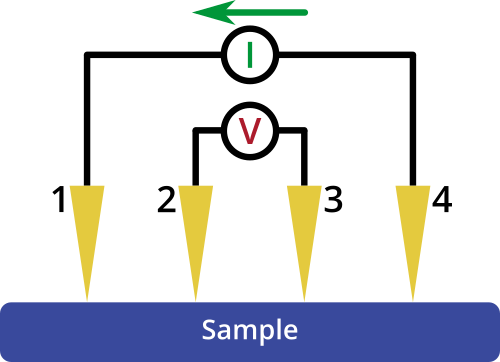4-Point Probe Method
4-Point Probe Method
4 point measurement
Standard four-point probe measuring methods are usually used to characterize the electrical conductivity or the resistivity of a sample, since these are usually straightforward to carry out and the influence of wires and contact resistances on the measurement result can be suppressed. When extended by a magnetic field, the hall constant and from that the charge carrier concentration and hall mobility can be measured.
For a correct measurement, the sample must form a closed area of constant thickness without holes, be electrically insulated and be contacted with four spatially separated electrodes. Commonly, two special cases of four-wire measurement, the Hall bar structure and the Van-der-Pauw measurement, are used with a specific sample geometry and measurement routine.

The four-wire measurement can in principle be used for both macroscopic and nanostructured samples, but the preparation effort depends on the material properties of the sample and the chosen direction of measurement, and can be a challenge under certain circumstances.
Examples include the creation of electrical contacts with low contact resistance on samples with limited conductivity and the cross-plane measurement of electrical conductivity on thin layers. The former can usually be solved by using large electrodes and the additional use of sample-specific contact pads made of a more suitable material. However, the correct placement of the electrodes for measuring the electrical conductivity in the confinement direction of thin films is more difficult.
What characteristics does the 4-point probe method determine?
The four-point probe method is used to determine the electrical transport properties of materials like the electrical conductivity, the resistivity, the hall constant, the charge carrier concentration and the charge carrier mobility.
